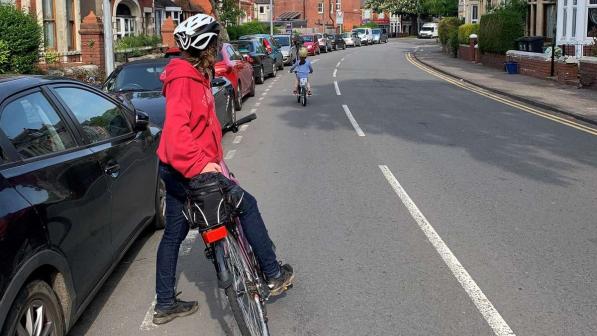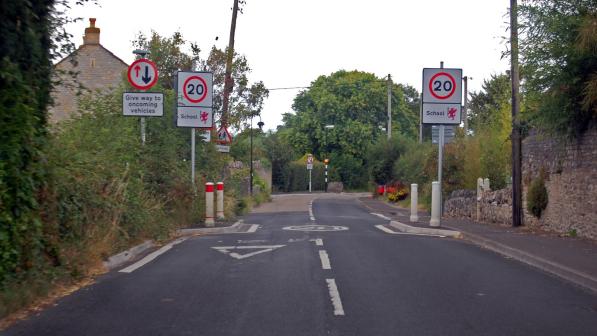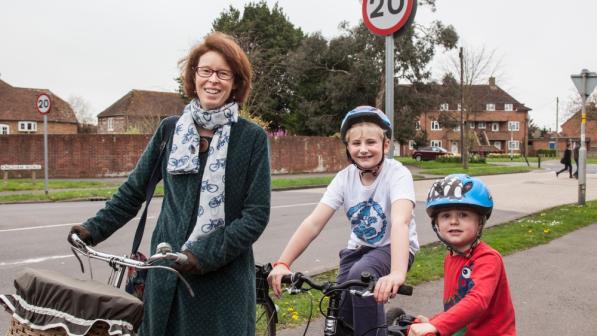We need to talk about speed during Brake’s Road Safety Week

The more people who accept Brake’s invitation to join its speed-themed Road Safety Week this year (19-25 November), the better.
This must be the national conversation Brake intends it to be because, at the moment, we don’t enjoy a consensus compelling enough to re-boot the mindset of speeding drivers, nor to persuade everyone that 20mph is the safest speed limit for most built-up streets.
Speeding
On the face of it, there shouldn’t be much re-booting to do on the subject of speeding. Not so long ago, 82% of adults surveyed in England agreed that “it is not safe to travel even slightly over the speed limit on residential streets”.
Why, then, do speed data from a sample of automatic traffic counters show that, under free-flowing conditions, 50% of cars drivers in Britain disobeyed the speed limit on 30mph roads in 2022, with 5% exceeding the limit by more than 10mph?
Why did two-fifths of drivers, by their own admission to the RAC, say they’d exceeded the 30mph limit at least occasionally in 2022? On 20mph roads, even more – 46% – admitted they’d broken the law, a figure that’s grown since 2020 when it stood at 39%.
This implies that, for a fair number of people, notions about speeding are jarring, unconsciously perhaps, with what happens at the wheel of their cars. Messages about the trauma caused by speeding don’t seem to be shaping driver behaviour either, although the most persuasive are based on indisputable facts.
Firstly, physics dictates that a vehicle’s speed influences how severe any collision with flesh and blood is likely to be; whether a victim lives or dies; whether there’s time to slow down and avoid hitting anyone at all.
Secondly, according to casualty statistics for Great Britain, police at the scene of traffic crashes thought that “exceeding the speed limit” or “travelling too fast for conditions” may have contributed to killing or seriously injuring about 36,300 people over the 10 years from 2013 to 2022.
This is probably an underestimate because “exceeding the speed limit” is among the factors that “may not be obvious to the officer” at a collision site. Any forensic investigation or court verdict may point to it later on, though.

20mph in Wales
Given physics and the huge number of people harmed by drivers going too fast, I’d say that policymakers who see the value of lower speeds, and are brave enough to translate this into action, don’t deserve a hard time from anybody.
But a hard time is exactly what the politicians who’ve knocked 10mph off the national default speed limit for ‘restricted roads’ in Wales have got – not from everyone by any means, it has to be said, but from thousands of petitioners and some very strident opposition members in the Senedd.
Clearly, it’s a struggle for some to see the point of this particular law, even though four out of five adults in Wales said in advance that they’d support a 20mph speed limit in their area.
But some objectors seem incapable of granting that 20mph is a reasonable expectation anywhere, apart from, maybe, outside schools and hospitals, as if children and other vulnerable people are tethered to one stretch of road alone, and no one else needs protecting.
They can’t see 20mph as the right move for increasing the appeal of active alternatives to the car, or why it’s good for communities, for the environment and for the wellbeing of future generations.
They can’t (or won’t) even acknowledge repeated reminders that this isn’t a ‘blanket’ but a ‘default’ limit, with Welsh councils empowered to make exceptions in line with set (pro-active travel) criteria.
Will the approval rating of this life-saving law in Wales change? Yes, probably, and for the better.
The law’s only two months in, the government is entirely open to a tidying-up exercise and Deputy Minister for Climate Change Lee Waters MS says that a large number of local authority leaders have told him that they’ve had “very little correspondence in recent weeks on this, that people are adapting to it, they’re getting used to it”.
As happened elsewhere (for example, in Bristol and Spain), the lived experience of 20mph may well be working its own magic, quelling a good deal of the clamour that preceded it.
As for compliance, the signs are good: early readings for about 300 miles-worth of affected roads suggest that most drivers obeyed the new limit in the first week, with the median speed dropping from 22.7mph to 19.8mph compared to the week before.
Some might say that minus 3mph doesn’t sound a lot – but it is, in road safety terms. Depending on the road, even a 1mph drop in mean speed can reduce the frequency of crashes – by about 6% “for urban roads with low average speeds”, for instance.
The pre-law median of 22.7mph also reveals that only statistical outliers drove regularly at anywhere near 30mph on these roads. The rest would have been travelling closer to 20mph, a finding that should quash fears about rocketing journey times and damaged livelihoods.
Beyond Wales
Turning to the powers that be in the rest of Britain, we have a split.
Scotland’s Road Safety Framework to 2030 delivery plan promises a national speed management review, and the government is also embracing 20mph for appropriate roads by 2025, albeit taking a different approach to that chosen by Wales.
On the other hand, England has of late embraced scepticism about local 20mph zones (the good old blanket rears its woolly head again).
Even Prime Minister Rishi Sunak seems determined to believe that Wales’s 20mph policy constitutes an attack on motorists and – oh no, not again! – a ‘blanket’.
Little may come of such cynical thinking, but our schisms aren’t helping.
So, we really do need to talk about speed and develop everyone’s understanding of it.
And we need to do this until we’re on target to save thousands from death, injury, trauma and bereavement, and transform our streets into safe, congenial places for playing, exploring, riding bikes and walking.
Sign up to Brake’s Road Safety Week, 19-25 November 2023, now.


